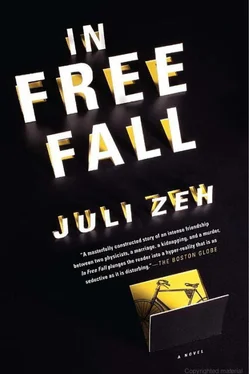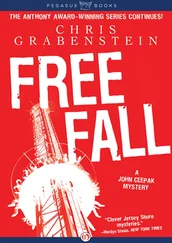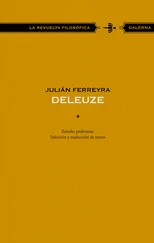The last thing I need is a beheaded cyclist, the detective thought , the detective thinks.
Two days ago, the walrus-mustached police chief had honored him with a personal phone call and—a sign of the estimation in which he is held—canceled the holiday Schilf had planned. “The Freiburgers can’t cope,” the chief had shouted into the telephone. “The hospital scandal is driving the whole town crazy. First four heart patients die, then a senior registrar is murdered. Even the blockheads in the press can see the connection. Take your vacation later, Schilf. Clear up this Dabbelink business first.”
In other circumstances, Schilf would have obeyed the chief’s orders without resistance. He obeys now, but his resistance is enormous. When he considers the matter carefully, there is a problem asleep in his apartment, and another problem (perhaps even the same one) that has inhabited his head for quite some time. The detective does not want to go to Freiburg now. He feels repelled by the thought of the tiny police apartment not far from Heinrich-von-Stephan-Strasse. He is not interested in dead anesthetists or the megalomania of a medical director. He has worked nonstop for years and he needs a break. Right now, there are more important things than this Dabbelink, who is in the safe mitts of Rita Skura.
Schilf considers smoking a cigarillo on an empty stomach, and abandons the idea. For a while he peers into the stillness of the courtyard. Slowly a cat walks across the cleanly swept flagstones. When Schilf starts moving again, it flees into the nearest building with one leap.
Some days there is just no choice other than to leave through the back door, the detective thought , the detective thinks.
He walks down the groaning metal steps. Ignoring the creaking in his knees and shoulders, he climbs sideways over the gate at the end of the fire escape and jumps the final one and a half meters down to the ground.
BARELY TWO HOURS LATER, Schilf leans his head against the cool, vibrating glass of a window, feeling his terrible headache subside. The air-conditioning is blowing into his face through a vent. In a broad curve the train rounds a small town, which with its church tower, half-timbered houses, and tidy meadows looks like an exhibit in an open-air museum. As the rear of the InterCity train comes into view, Schilf thinks, as he does on every train journey, what a miracle of human endeavor he is sitting in. What powerful masses are accelerated by mankind, what pains it takes to wrest materials from the earth in order to forge them into something that serves a great idea. And how it strives toward a goal that, despite thousands of years of philosophical efforts by the cleverest of men, is still utterly unknown.
When the next stretch of forest wraps itself around the train, he turns his gaze away from the window and the world becomes a blur in the corner of his left eye.
Schilf managed to miss the five o’clock train to Freiburg even though he had reached the Stuttgart station with plenty of time to spare. A magazine held him up—it was lying on the platform and he nearly slipped on it. He picked it up out of the wind, which was riffling its pages, and read where it had fallen open.
The article, by a professor of physics, was about the theories of the time-machine murderer—the case that had brought Schilf a promotion to first detective chief superintendent and, moreover, secured him a modest place in police history. As he devoured the article, he felt as if it had been written just for him. He stood reading in front of the departure board, did not move aside when someone asked him to, did not hear the announcement about the train’s arrival, and was quite unable to tear his eyes from the article. When he had finished, he looked up at the departing train in astonishment, ready to believe that he was sitting in his reserved seat—number 42 in coach 24—and was traveling, split from himself, on another train track into a parallel universe. His right hand fingered his temples as if he were looking for a lever to reverse his little mistake. He had simply looked up from the magazine too late, and not jumped onto the train. Such a detail could surely not have buried itself in the world’s memory so quickly and so irrevocably.
Schilf stood alone, lost in thought in the nighttime quiet of the platform, and remained in the same spot for one hour, without moving. When the next train drew in, he had not even started waiting.
The InterCity train in which he now sits is exactly the same as the one he has missed. Doggedly, Schilf sits in seat 42, coach 24. He places his feet to the left and the right of his bag, puts his hands on his knees, and stretches his back. In this position, he is able to stare off the headache that has resurfaced and also forget about his spine for a while. As he has known for some time, aging does not only bring the ability to wake at four in the morning without being able to go back to sleep. Aging is above all a continuing rendezvous with one’s own body, a dialogue with pipes, filters, hinges, and pumps that have been doing their work behind the scenes for years, but now suddenly impinge on the consciousness with their demands for attention. Mapping the self is equivalent to dying; to have totally grasped oneself is death, the detective thinks, sitting upright like a statue, swaying gently with the rise and fall of the train. Once again he says to himself that his badly constructed replacement life has finally been turned upside down. He feels ridiculously happy at the thought. Mentally he feels sharper than he has for a long time, precisely here: at the outer limit of his strength.
Outside, the landscape interrupts its hurried progress; a few passengers get off and on. Schilf lifts his bag onto the seat next to him so that nobody will sit there. The magazine that has gripped him sticks out of a side pocket willfully. If Schilf has understood correctly, the physics professor’s statements seem to confirm the theories of the time-machine murderer. But it is not entirely clear if the professor is defending the Many-Worlds Interpretation or merely explaining it. The detective turns to the contents page once again. The square photo shows a blond, laughing professor. He looks happy. Schilf likes the caption: “Everything that is possible happens.” Somehow this fits with his hazy ideas about the program code for reality, even though the time-foam model seems much too clichéd.
EVEN AS A CHILD, he loved the idea that the world could really be quite different from the way human beings perceived it. In summer, the little detective lay on his belly in the garden behind his parents’ house talking to a butterfly about whether the nut tree by the wall was really a single object or, as seen through the compound eye of the insect, a conglomeration of two thousand nut trees spliced together. There was no conclusion to the discussion, for both the little detective and the butterfly were irrefutably right. From this butterfly, from echo-sounding bats, and from mayflies, Schilf has learned that time, space, and causality are matters of perspective, in the truest sense of the word. Lying in the grass, distracted and focused at the same time, he did not find it difficult to let go of the guide-rail of familiar perception for a few moments and to float free over an unimaginable chaos. How nicely he chatters away to himself, said one delighted parent to the other. Whereas the detective came close to losing his mind at the age of ten.
His childish efforts have developed into a method of working now, except Schilf can no longer lie in the garden. With painful concentration, he bores holes into the desktop made up of crime scene descriptions and witness statements until it is porous enough to allow for conclusions about the program code, about reality. He sees coincidences as metaphors and contradictions as oxymorons, and the repeated appearance of details as leitmotifs. When Schilf gets a hollow feeling in his stomach, as if he were on a trajectory at the very apex of a parabola, he reaches out instinctively to hold on to something (the corner of a table, a door frame, the edge of the sink) and reaps the reward for his efforts: premonitions, daydreams, feelings of déjà vu.
Читать дальше












